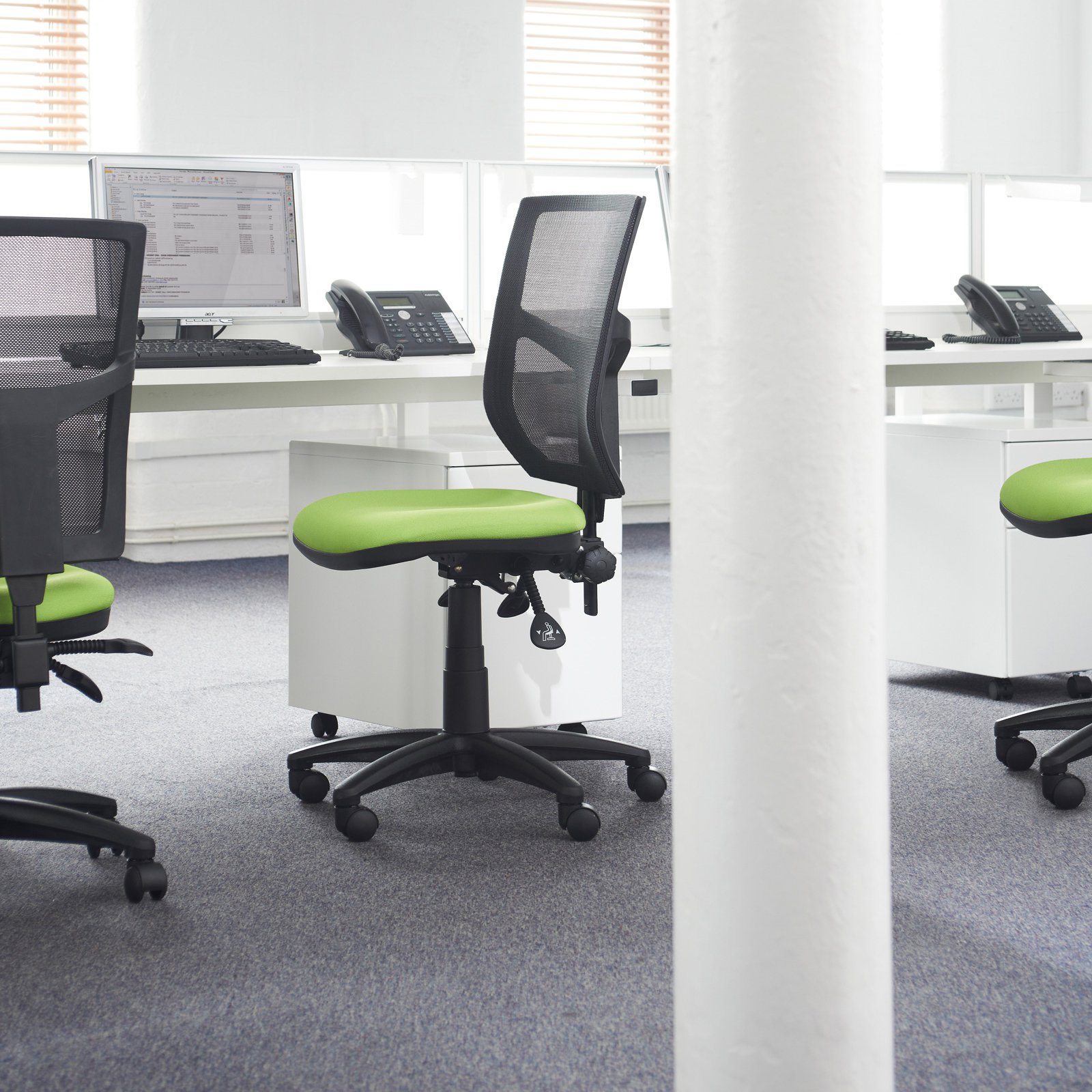This post is 3000 words long, 5 / 7 mins reading time. However, this post has been made with extensive research and listening to numerous customers stories. 🙂 🙂

Intro
Welcome to our blog about mental health in the office! In today’s fast-paced and high-stress work environment, taking care of our mental well-being is more important than ever. One aspect that often gets overlooked is the impact of our workspace on our mental health. That’s why we’re talking about ergonomic office furniture and how it can help alleviate concerns and promote a healthier and more comfortable work environment. Keep reading to learn more about the benefits of incorporating ergonomic office furniture into your office space.
Understanding the Link Between Mental Health and Workplace Environment

The link between mental health and the workplace environment is an important aspect that should not be ignored. Our mental well-being can be greatly influenced by the conditions in which we work, and it is essential to create a supportive and healthy atmosphere to promote overall happiness and productivity.
One common factor that can contribute to mental health concerns in the workplace is stress. High levels of stress can lead to anxiety and other mental health issues, making it crucial to address this issue head-on. The environment in which we work plays a significant role in our stress levels. A cluttered and disorganised workspace can create a sense of chaos and overwhelm, making it difficult to focus and concentrate. On the other hand, a clean and well-organised office can promote a sense of calm and efficiency.
Another aspect of the workplace environment that can impact mental health is physical comfort.

Many office workers spend long hours sitting at a desk, which can lead to various health issues, such as back pain and shoulder pain. These physical discomforts can affect our mood and overall well-being, making it important to address them. By incorporating ergonomic office furniture, such as adjustable chairs and standing desks, employees can enjoy improved posture and reduced strain on their bodies. This, in turn, can help alleviate physical discomfort and promote a healthier and more comfortable work environment.
In addition to physical comfort, the social environment in the office also plays a crucial role in mental health.

it is essential to create a supportive and inclusive workplace culture where employees feel comfortable expressing their concerns and seeking help when needed. Encouraging team members to openly communicate and discuss their mental health concerns can create a sense of trust and support. This can be achieved through regular check-ins and healthy dialogue, where employees are encouraged to express any anxieties or concerns they may have.
Complaining about concerns and bottling up emotions can contribute to increased stress and a decline in mental well-being. By encouraging open communication, managers can create an environment where employees feel heard and supported. This, in turn, can help prevent the development of more serious mental health issues and promote overall well-being in the workplace.
It is important to note that implementing these changes and promoting mental health awareness in the office can come with its own set of challenges. Resistance to change and the fear of discussing mental health concerns openly may be barriers that need to be overcome. However, the benefits of adopting an employee-centric mental health initiative far outweigh the challenges. By prioritising the well-being of employees, companies can create a positive work environment where individuals can thrive both professionally and personally.
The Role of Ergonomic Office Furniture in Mental Well-being

In today’s fast-paced and high-stress work environment, our mental well-being can often take a backseat. However, the role of our workspace in our mental health should not be overlooked. One powerful way to promote mental well-being in the office is by incorporating ergonomic office furniture. Ergonomic furniture is designed to provide optimal support and comfort, reducing the risk of physical discomfort and promoting a healthier and more comfortable work environment.
One common issue that many office workers face is back pain. Sitting for long periods can put a strain on our backs, leading to discomfort and even chronic pain. This physical discomfort can greatly impact our mental well-being, causing frustration, irritability, and even anxiety. By using ergonomic chairs that offer proper lumbar support and are adjustable to individual needs, employees can maintain good posture and reduce the risk of developing back issues. This can contribute to a more comfortable and enjoyable work experience, ultimately promoting mental well-being.
Another benefit of ergonomic office furniture is its ability to address other physical discomforts, such as shoulder pain. Many individuals experience shoulder and neck tension due to prolonged hours of typing or using a mouse. Ergonomic desks and chairs that can be adjusted to the correct height and angle can help alleviate strain on the shoulders, reducing the risk of discomfort and promoting a more relaxed and focused mindset.
The impact of ergonomic office furniture extends beyond physical comfort. By promoting better posture and reducing physical discomfort, employees can experience improved overall well-being. When our bodies are at ease, it is easier to concentrate, focus, and maintain a positive mindset. This can lead to increased productivity and a greater sense of satisfaction in our work.
In addition to the physical benefits, ergonomic office furniture also encourages collaboration and teamwork. Standing desks, for example, promote movement and create an open and inclusive atmosphere. When employees have the option to stand and move around, they are more likely to engage with their colleagues and contribute to a positive social environment. This social interaction is crucial for mental well-being, as it fosters a sense of belonging and support within the office community.
By incorporating ergonomic office furniture into the workspace, employers can demonstrate their commitment to employee well-being and mental health. This proactive approach sends a powerful message that the company values its employees and their comfort. By providing a comfortable and supportive work environment, employers can reduce stress levels, increase job satisfaction, and create a positive workplace culture.
Strategies for Promoting Mental Health Awareness in the Workplace
Promoting mental health awareness in the workplace is crucial for creating a supportive and healthy work environment. It’s important for employers to prioritise the well-being of their employees and take proactive steps to address mental health concerns. Here are some strategies that can be implemented to promote mental health awareness in the workplace.
- Conduct Regular Check-ins: Regular check-ins with employees can help assess their well-being and identify any mental health concerns. Managers should make it a priority to have open and honest conversations with their team members, providing a safe space for employees to share their thoughts and concerns. By checking in regularly, managers can better understand the challenges their employees are facing and offer support where needed.
- Encourage Healthy Dialogue: Encouraging team members to openly communicate about their mental health concerns can create a supportive and inclusive workplace culture. Employees should feel comfortable expressing their anxieties and seeking help when needed. By fostering healthy dialogue, managers can create an environment where employees feel heard and supported, reducing the stigma surrounding mental health.
- Provide Mental Health Resources: Employers should provide resources and support for employees who may be experiencing mental health issues. This can include offering access to mental health professionals or providing educational materials on stress management and coping mechanisms. By providing these resources, employers demonstrate their commitment to the well-being of their employees and encourage a culture of support.
- Raise Awareness: It’s important to raise awareness about mental health in the workplace. This can be done through workshops, seminars, or webinars that focus on mental health education and support. Employers can also implement mental health awareness campaigns or initiatives to promote a greater understanding and empathy towards mental health issues.
- Training and Education: Employers should provide training and education for managers and employees on mental health awareness and support. This can help them identify signs of mental health concerns in their colleagues and provide appropriate support. By equipping employees with the knowledge and tools to support their peers, employers can create a workplace where everyone feels supported and understood.
- Encourage Work-Life Balance: A healthy work-life balance is essential for maintaining good mental health. Employers should encourage employees to take regular breaks, set boundaries, and prioritise self-care. By promoting work-life balance, employers show that they value their employees’ well-being and understand the importance of taking care of one’s mental health.
- Lead by Example: Managers and leaders should lead by example when it comes to promoting mental health awareness. They should openly discuss mental health, share their own experiences, and encourage team members to prioritise their well-being. When leaders show that mental health is a priority, it encourages employees to do the same.
Implementing Regular Check-ins and Healthy Dialogue with Employees
Implementing regular check-ins and healthy dialogue with employees is crucial for promoting mental health awareness in the workplace. By creating a safe and supportive environment for employees to express their concerns and seek help, employers can contribute to a positive and healthy work culture.
Regular check-ins provide an opportunity for managers to assess the well-being of their team members. These check-ins can be conducted on a one-to-one basis, allowing managers to have open and honest conversations with their employees. By checking in regularly, managers can better understand the challenges their employees are facing and offer support where needed. This proactive approach shows that employers care about their employees’ mental well-being and creates a sense of trust and support within the team.
In addition to regular check-ins, it is important to encourage healthy dialogue among team members. Creating a supportive and inclusive workplace culture where employees feel comfortable expressing their anxieties and seeking help is crucial. By fostering open communication, managers can create an environment where employees feel heard and supported, reducing the stigma surrounding mental health. This can be achieved through team meetings, group discussions, or even setting up dedicated channels for employees to share their concerns.
It is important for managers to create a safe space for employees to discuss their mental health concerns without fear of judgement or negative repercussions. Encouraging team members to support and empathise with one another is essential for promoting a healthy work environment. By providing guidance on how to listen and offer support, managers can equip employees with the skills to be effective allies to their colleagues.
Furthermore, it is important for managers to lead by example and openly discuss mental health. By sharing their own experiences and struggles, managers can create a culture of vulnerability and encourage team members to prioritise their mental well-being. When employees see their managers prioritising mental health, it sets a powerful example and encourages them to do the same.
Implementing regular check-ins and healthy dialogue with employees can have numerous benefits. It can help identify potential mental health concerns early on, allowing for timely intervention and support. It also fosters a sense of belonging and support within the team, reducing feelings of isolation and anxiety. By creating an open and supportive environment, employers can contribute to higher job satisfaction, increased productivity, and better overall mental well-being among their employees.
However, it is important to acknowledge that implementing regular check-ins and healthy dialogue may come with its challenges. Some employees may be hesitant to discuss their mental health concerns due to fear of judgement or potential negative consequences. It is important for managers to create a safe and non-judgemental space for employees to express their concerns. Additionally, providing resources and support for mental health can help alleviate some of these challenges.
Benefits and Challenges in Adopting an Employee-Centric Mental Health Initiative
Promoting mental health in the office through an employee-centric initiative has numerous benefits for both the employees and the organisation as a whole. By prioritising mental well-being and creating a supportive work environment, companies can see improved employee satisfaction, increased productivity, and reduced turnover rates. However, it’s important to acknowledge that implementing such an initiative may come with its own set of challenges.
One of the primary benefits of adopting an employee-centric mental health initiative is the reduction of anxiety and stress among employees. When employees feel supported and heard, they are less likely to experience high levels of anxiety in the workplace. This, in turn, leads to improved mental well-being and overall job satisfaction. Additionally, by addressing mental health concerns proactively, companies can prevent more serious mental health issues from arising and impacting employees’ ability to perform their best.
Another benefit of an employee-centric mental health initiative is the positive impact it has on employees with a bad back or other physical discomforts. Many office workers suffer from back pain and other physical ailments due to prolonged periods of sitting. By providing ergonomic office furniture, such as adjustable chairs and standing desks, companies can help alleviate these physical discomforts. When employees have better physical comfort, they are more likely to be happier and more productive at work.
Implementing an employee-centric mental health initiative can also encourage team members to support and encourage one another. By openly discussing mental health concerns, companies create a culture of empathy and understanding. Employees feel more comfortable reaching out to their team mates for support, which can strengthen the overall team dynamics and foster a sense of community. When employees know they are not alone in their struggles, they are more likely to ask for help when needed.
While there are numerous benefits to adopting an employee-centric mental health initiative, there may also be challenges that need to be overcome. One potential challenge is the fear of discussing mental health concerns openly. There may be a stigma attached to mental health issues, and employees may worry about negative consequences or judgement if they disclose their struggles. Companies can overcome this challenge by creating a safe and non-judgemental environment where employees feel comfortable sharing their concerns.
Another challenge may be resistance to change. Some employees and managers may be hesitant to adopt new practices or policies related to mental health. Overcoming this challenge requires clear communication and education about the benefits of an employee-centric mental health initiative. Managers can explain the positive impact it can have on both individual employees and the organisation as a whole.
In conclusion, adopting an employee-centric mental health initiative in the office has numerous benefits, including reduced anxiety, improved physical comfort, and increased support among team members. However, there may be challenges along the way, such as overcoming the fear of discussing mental health and resistance to change. By addressing these challenges and prioritising mental well-being, companies can create a positive work environment where employees can thrive both professionally and personally.








































































































































































































